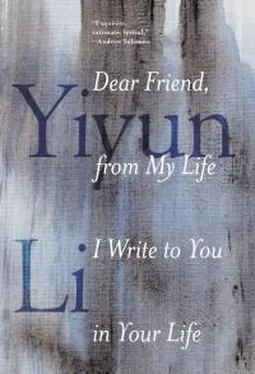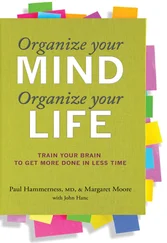—
CHINESE IMMIGRANTS OF my generation in America criticize my English for not being native enough. A compatriot emailed, pointing out how my language is neither lavish nor lyrical, as a real writer’s language should be; you only write simple things in simple English, you should be ashamed of yourself, he wrote in a fury. A professor in graduate school told me I should stop writing, as English would remain a foreign language to me. Their concerns about ownership of a language, rather than making me impatient like Nabokov, allow me secret laughter. English is to me as random a choice as any other language. What one goes toward is less definitive than that from which one turns away.
Before I left China I destroyed the journals I had kept for years and most of the letters written to me (what I could not bring myself to destroy I sealed up and have never opened); my letters to others I would have destroyed too, had I had them. But one’s relationship with a native language is similar to that with the past. There is not a moment one could point to and say: this is the beginning of my past, or this is the beginning of my relationship with my mother tongue, up until that moment I was free. What comes before—other people’s past, other people’s relationship with that language—claims a right against one’s will. Rarely does a story start where we wish it had, or end where we wish it would.
—
ONE CROSSES THE border to become a new person. One finishes a manuscript and cuts off the characters. One adopts a language. These are false and forced frameworks, providing illusory freedom, as time provides illusory leniency when we, in anguish, let it pass monotonously. To kill time —an English phrase that still chills me: time can be killed but only by frivolous matters and purposeless activities. No one thinks of suicide as a courageous endeavor to kill time.
In the hospital, a group of nursing students came to play bingo one Friday night. A young woman asked if I would join her. Bingo, I said; I’ve never in my life played. She thought for a moment and said that she had only played bingo in the hospital. It was her eighth hospitalization; she had been schooled for a while in the hospital, and once she pointed out a small patch of fenced-in green where she and other children had been let out to exercise. Often her father visited her in the afternoon, and I would watch them sitting together playing a game, not attempting conversation. By then, all words must have been inadequate; language does little to help a mind survive time.
Yet language is capable of sinking a mind. One’s thoughts are slavishly bound to language. I used to think an abyss is a moment of despair becoming interminable, but any moment, even the direst, is bound to end. What is abysmal is that one’s erratic language closes on one as quicksand. Yet what is spoken by others—truth as cliché, cliché as the only truth—is as indisputable as the retreating solid ground, getting further and further beyond reach. The abyss is that time is annulled by language. We can kill time, but language kills us.
“Patient stated that she felt like a burden to loved ones”—much later, when I read the notes from the emergency room, I did not have any recollection of the conversation. A burden to loved ones : this language must have been provided to me. I would never use the phrase in my thinking or writing. But my resistance has little to do with avoiding a platitude. To say a burden is to grant oneself weight in other people’s lives; to call them loved ones is to fake one’s ability to love. One does not always want to subject oneself to self-interrogation imposed by a cliché.
—
WHEN KATHERINE MANSFIELD was still a teenager in New Zealand, she wrote in her journal about a man next door playing for weeks on a cornet “Swanee River.” “I wake up with the ‘Swanee River,’ eat it with every meal I take, and go to bed eventually with ‘all de world am sad and weary’ as a lullaby.” I read Mansfield’s notebooks and Marianne Moore’s letters around the same time. Moore in a letter described a fundraiser at Bryn Mawr, maidens in bathing suits and green bathing tails on a raft: “It was really most realistic…way down upon the Swanee river.”
I marked the entries because they reminded me of a moment I had forgotten. I was nine, and my sister thirteen. On a Saturday afternoon, I was in our apartment and she was on the balcony. My sister joined the middle-school choir that year, and in the autumn sunshine she sang in a voice that was beginning to leave girlhood. Way down upon the Swanee River. Far, far away. That’s where my heart is turning ever; That’s where the old folks stay.
The lyrics were in Chinese. The memory too should be in Chinese. But I cannot see our tiny garden with the grapevine, which our father cultivated and which later was uprooted by our wrathful mother, or the bamboo fence dotted with morning glories, or the junk that occupied half the balcony, years of accumulations piled high by our father, if I do not name these things to myself in English. I cannot see my sister, but I can hear her sing the lyrics in English.
Over the years my brain has banished Chinese. I dream in English. I talk to myself in English. And memories—not only those about America but also those about China; not only those carried on but also those archived with the wish to forget—are sorted in English. To be orphaned from my native language felt, and still feels, a crucial decision.
Would you ever consider writing in Chinese? an editor from China asked, as many had asked before. I said I doubted it. But don’t you want to be part of contemporary Chinese literature? he asked. I have declined to have my books translated into Chinese, which is understood by some as odiously pretentious. Once in a while my mother will comment, hinting at my selfishness, that I have deprived her of the pleasure of reading my books. But Chinese was never my private language. And it will never be.
That I write in English—does it make me part of something else? The verdict of my professor in graduate school was that I was writing in a language that did not belong to me, hence I would not, and should not, belong. But his protest was irrelevant. I have not been using the language to be part of something.
—
WHEN WE ENTER a world—a new country, a new school, a party, a family or a class reunion, an army camp, a hospital—we speak the language it requires. The wisdom to adapt is the wisdom to have two languages: the one spoken by others, and the one spoken to oneself. One learns to master the public language not much differently from the way one acquires a second language: assess the situations, construct sentences with the right words and the correct syntax, catch a mistake if one can avoid it, or else apologize and learn the lesson after a blunder. Fluency in the public language, like fluency in a second language, can be achieved with enough practice.
Perhaps the line between the two languages—the public and the private—is, and should be, fluid; it is never so for me. I often forget, when I write, that English is also used by others. English is my private language. Every word has to be pondered over before it becomes my word. I have no doubt—can this be an illusion?—that the conversation I have with myself, however linguistically flawed, is the conversation that I have always wanted, in the exact way I want it to be.
In my relationship with English, in this relationship with its intrinsic distance that makes people look askance, I feel invisible but not estranged. It is the position I believe I always want in life. But with every pursuit there is the danger of crossing a line, from invisibility to erasure.
There was a time I could write well in Chinese. In school my essays were used as models; in the army, our squad leader gave me the choice between drafting a speech for her and cleaning the toilets or the pigsties—I always chose to write. Once in high school, several classmates and I entered an oratory contest. The winner would represent the class in a patriotic event. When I went onstage, for some mischievous reason, I saw to it that many of the listeners were moved to tears by the poetic and insincere lies I had made up; I moved myself to tears, too. That I could become a successful propaganda writer crossed my mind. I was disturbed. A young person wants to be true to herself and to the world. But what did not occur to me then was to ask: Can one’s intelligence rely entirely on the public language; can one form a precise thought, recall an accurate memory, or even feel a genuine feeling, with only the public language?
Читать дальше












